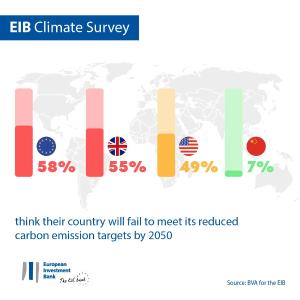
The first part of the 2021-2022 EIB Climate Survey explores people’s views on climate change in a rapidly changing world. The results from this release focus on citizens’ perceptions of climate change and the actions they expect their country to take to combat it.
- 77% of Germans think that climate change and its consequences are the biggest challenge for humanity
- 72% feel that climate change has an impact on their everyday lives
- 68% believe that they are more concerned about the climate emergency than their government
- 63% of Germans think that their country will fail to drastically reduce its carbon emissions
- 62% would welcome a tax on products and services that contribute most to global warming
77% of Germans think that climate change and its consequences are the biggest challenge for humanity in the 21st century. This figure is greater than 70% across all age groups and political leanings of the German population.
However, this apparent consensus hides significant gaps between different groups of the German population. There are very different levels of concern and expectations on the topic among younger and older citizens, as well as among people who have left-leaning and right-leaning political views.
These are some of the results from the first part of the 2021-2022 Climate Survey published today by the European Investment Bank (EIB). The EIB is the lending arm of the European Union and the world’s largest multilateral lender for climate action projects.
Perception of the climate crisis
The vast majority of Germans (72%) feel that climate change has an impact on their everyday lives. While this is particularly marked among 15-29-year-olds (81%), this figure drops 11 points (70%) for people older than 65. 81% of people who have left-leaning political views say they feel this impact in their everyday lives, which is 16 points higher than those who have right-leaning political views (65%).
68% believe that they are more concerned about the climate emergency than their government. As a consequence, they are fairly pessimistic regarding their country’s capability to undergo an ambitious green transition. Only 37% think that Germany will succeed in drastically reducing its carbon emissions by 2050, as pledged in the Paris Agreement. There is a generational gap with a 10-point difference between people younger than 29 (41% who believe Germany will succeed) and people older than 65 (31% who think Germany will succeed). 69% of people over 65 believe Germany will fail to meet the 2050 deadline. 68% of people with left-leaning political views share this pessimism, which is 10 points higher than the figure for people with right-leaning political views (58%).
Meanwhile, 9% of German people who have left-leaning political views believe that global warming is not due to human activities, which is 15 points below the figure for people with right-leaning political views (24%). Furthermore, 33% of German people who have far-right political leanings are still sceptical about humans being the main cause of the climate crisis.
The energy debate
When asked about the source of energy their country should rely on to fight global warming, the majority of German people favour renewable energies (58%), a sentiment that is shared even more by Europeans as a whole (63%). Support for renewables in Germany is seen less strongly among people younger than 29 (56% in favour), 9 points lower than the figure for people over 65 (65%). German people with left-leaning political views support renewables much more strongly than those with right-leaning political views (69% compared to 42%), a difference of 27 points. The political divide on energy policy seems to be even bigger than in France, the country of the “yellow vests” protests, where there is a 13-point difference between left and right on support for renewable energies (61% vs. 48%).
Men (15%) and people older than 65 (12%) are more in favour of nuclear energy than women (7%) and people younger than 29 (10%). However, overall, German people are slightly less supportive of nuclear energy than other Europeans (11% vs. 12%). People with right-leaning political views in Germany are much more in favour of the development of nuclear energy (29%) compared to those with left-leaning political views (7%).
Most popular solutions to fight climate change among Germans
Radical change in individual behaviour is the best way to fight climate change, according to 54% of German people, rather than technological innovation (36%). While there is no significant generational gap on this question, German people with left-leaning political views have much more confidence in a change in individual habits than those with right-leaning political views (65% vs. 46%, a difference of 19 points).
The majority of Germans would support (62%) – although less than other Europeans (69%) – the introduction of a tax on products and services that contribute most to global warming. They are also in favour of a 5-year minimum warranty on any electric or electronic product (88%) and replacing short-distance flights with fast, low-emission trains (85%). They also favour softer measures like strengthening education and increasing youth awareness of sustainable consumption (89%).
EIB Vice-President Ambroise Fayolle said: “Despite some clear generational and political divides, a significant majority of German people are requesting stricter measures and tools, such as cleaner energy sources, from public authorities in order to help them combat climate change. In the run-up to COP26, these demands from the public are a clear mandate for us to strengthen our efforts and accelerate the green transition. As the EU climate bank, the EIB’s role is to finance projects that focus on clean energy, energy savings, sustainable mobility solutions and innovations that will help limit the rise in temperature to 1.5°C or less.”
Download the Excel spreadsheet with the raw data for all 30 countries surveyed here. Please click here to access the EIB website page that presents key findings of the EIB Climate Survey IV.
About the EIB Climate Survey
The European Investment Bank has launched the fourth edition of the EIB Climate Survey, a thorough assessment of how people feel about climate change. Conducted in partnership with market research firm BVA, the fourth edition of the EIB Climate Survey aims to inform the broader debate on attitudes and expectations in terms of climate action. More than 30 000 respondents participated in the survey between 26 August and 22 September 2021, with a representative panel for each of the 30 countries polled.
About the European Investment Bank
The European Investment Bank is active in around 160 countries and is one of the world’s largest multilateral lenders for climate action projects. The EIB Group has recently adopted its Climate Bank Roadmap to deliver on its ambitious agenda to support €1 trillion of climate action and environmental sustainability investments in the decade to 2030 and to deliver more than 50% of EIB finance for climate action and environmental sustainability by 2025. As part of the Roadmap, all new EIB Group operations have also been aligned with the goals and principles of the Paris Agreement since the start of 2021.
About BVA
BVA is an opinion research and consulting firm recognised as one of the most innovative market research firms in its sector. Specialised in behavioural marketing, BVA combines data science and social science to make data inspiring and bring it to life. BVA is also a member of the Worldwide Independent Network of Market Research (WIN), a global network of some of the world’s leading market research and survey players, with over 40 members.

Photographer: EIB ©EIB
Download original

Photographer: EIB ©EIB
Download original

Photographer: EIB ©EIB
Download original

Photographer: EIB ©EIB
Download original

Photographer: EIB ©EIB
Download original